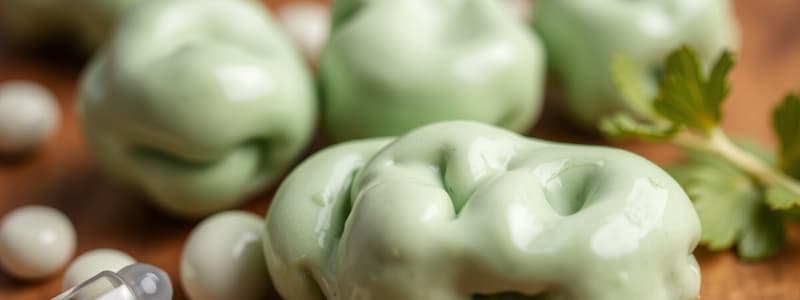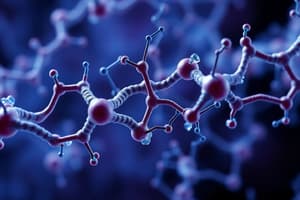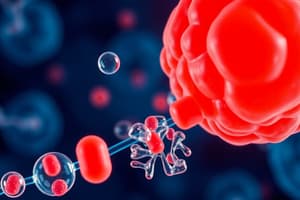Podcast
Questions and Answers
What is cholesterol specifically classified as?
What is cholesterol specifically classified as?
a steroid
Which hormones are made from cholesterol?
Which hormones are made from cholesterol?
estradiol and testosterone
Which of the following characteristics is true for saturated fats?
Which of the following characteristics is true for saturated fats?
- They are solid at room temperature. (correct)
- They have single bonds within the carbon chain. (correct)
- They are liquid at room temperature.
- They have double bonds within the carbon chain.
Which fat has the least number of hydrogen atoms?
Which fat has the least number of hydrogen atoms?
Of what are phospholipids important components?
Of what are phospholipids important components?
What is the basic structure of a steroid?
What is the basic structure of a steroid?
Besides its use in hormone production, for what does the body use cholesterol?
Besides its use in hormone production, for what does the body use cholesterol?
What are the four classes of lipids and what is an example of each?
What are the four classes of lipids and what is an example of each?
Why have trans fats been banned from some restaurants?
Why have trans fats been banned from some restaurants?
What is it about the structure of triglycerides that gives them their physical characteristics?
What is it about the structure of triglycerides that gives them their physical characteristics?
Water moves via osmosis across plasma cell membranes in which direction?
Water moves via osmosis across plasma cell membranes in which direction?
What happens to the membrane of a vesicle after exocytosis?
What happens to the membrane of a vesicle after exocytosis?
If a doctor injected a patient with what was labeled as an isotonic saline solution, but then the patient died, and an autopsy revealed that several of the patient's red blood cells had burst, would it be true that the injected solution was really isotonic?
If a doctor injected a patient with what was labeled as an isotonic saline solution, but then the patient died, and an autopsy revealed that several of the patient's red blood cells had burst, would it be true that the injected solution was really isotonic?
____ is an essential fatty acid because it is not synthesized by the body.
____ is an essential fatty acid because it is not synthesized by the body.
___ can exist in cis and trans configuration.
___ can exist in cis and trans configuration.
___ have kinks and are major constituents of liquid oils.
___ have kinks and are major constituents of liquid oils.
___ can be hydrogenated to form saturated fatty acids.
___ can be hydrogenated to form saturated fatty acids.
___ is bad cholesterol and ___ is good cholesterol.
___ is bad cholesterol and ___ is good cholesterol.
Match the following lipid types with their descriptions:
Match the following lipid types with their descriptions:
___ is still a passive transport.
___ is still a passive transport.
___ needs ATP.
___ needs ATP.
___ have fatty acids are esterified with glycerol backbone, and ___ are triglycerides where one fatty acid chain is replaced by phosphate group.
___ have fatty acids are esterified with glycerol backbone, and ___ are triglycerides where one fatty acid chain is replaced by phosphate group.
What are the building blocks of nucleic acids?
What are the building blocks of nucleic acids?
What may a nucleotide of DNA contain?
What may a nucleotide of DNA contain?
What is found in RNA that is not in DNA?
What is found in RNA that is not in DNA?
Where is the largest amount of DNA found in a eukaryotic cell?
Where is the largest amount of DNA found in a eukaryotic cell?
% of A = __% & % of G = __%
% of A = __% & % of G = __%
Meselson and Stahl's experiments proved that DNA replicates by which mode?
Meselson and Stahl's experiments proved that DNA replicates by which mode?
The experiments by Hershey and Chase helped confirm that DNA was the hereditary material on the basis of the finding of what?
The experiments by Hershey and Chase helped confirm that DNA was the hereditary material on the basis of the finding of what?
What are some differences between DNA and RNA?
What are some differences between DNA and RNA?
Which molecule carries information in a form that is inherited from one generation to another?
Which molecule carries information in a form that is inherited from one generation to another?
What do RNA and DNA have in common?
What do RNA and DNA have in common?
Flashcards are hidden until you start studying
Study Notes
Cholesterol and Lipids
- Cholesterol is classified as a steroid.
- Hormones synthesized from cholesterol include estradiol and testosterone.
- Saturated fats are solid at room temperature and have single bonds in their carbon chains.
- Unsaturated fats have fewer hydrogen atoms compared to saturated fats.
- Phospholipids are key components of the plasma membrane in animal cells.
- A steroid's structure consists of four fused hydrocarbon rings.
- Cholesterol also aids in the production of bile salts.
- Four classes of lipids include:
- Fats (e.g., margarine)
- Waxes (e.g., feathers' coating)
- Phospholipids (e.g., cell membrane constituents)
- Steroids (e.g., cholesterol).
- Trans fats are banned in some restaurants due to their harmful effects on health; they are produced by hydrogenating oils which increases saturation and LDL levels.
- The structure of fatty acids influences their physical properties; unsaturated and trans fats contain double bonds, while saturated fats do not.
Transport Mechanisms
- Water moves via osmosis from areas of high water concentration to low concentration across plasma membranes.
- The membrane of a vesicle fuses with the plasma membrane after exocytosis.
- An injection labeled as isotonic that causes red blood cell rupture indicates it was hypotonic instead.
- Facilitated diffusion is a form of passive transport, while active transport requires ATP.
Fatty Acid Configurations
- Omega-3 is an essential fatty acid that the body cannot synthesize.
- Unsaturated fatty acids can exist in both cis and trans configurations.
- Cis fatty acids have kinks in their structure and are major components of liquid oils.
- Saturated fats can be hydrogenated to become saturated fatty acids.
Cholesterol Types
- LDL (low-density lipoprotein) is referred to as 'bad' cholesterol, while HDL (high-density lipoprotein) is known as 'good' cholesterol.
Nucleic Acids
- Waxes are long-chain alcohols esterified to fatty acids, while triglycerides consist of fatty acids esterified with a glycerol backbone.
- The building blocks of nucleic acids are nucleotides.
- A DNA nucleotide may consist of deoxyribose, thymine, and a phosphate group.
- RNA contains ribose and uracil, which are absent in DNA.
- The nucleus holds the largest amount of DNA within a eukaryotic cell.
- The percentage of adenine (A) equals thymine (T), and guanine (G) equals cytosine (C).
- Meselson and Stahl's experiments showed that DNA replication is semi-conservative.
- Hershey and Chase's experiments demonstrated that DNA is the hereditary material through the detection of radioactive phosphorus in cells.
- DNA differs from RNA; DNA has deoxyribose and thymine, while RNA has ribose and uracil.
- Hereditary information is stored in DNA, and both RNA and DNA share the characteristic of containing four different nucleotides.
Studying That Suits You
Use AI to generate personalized quizzes and flashcards to suit your learning preferences.





